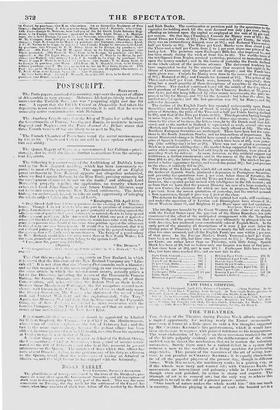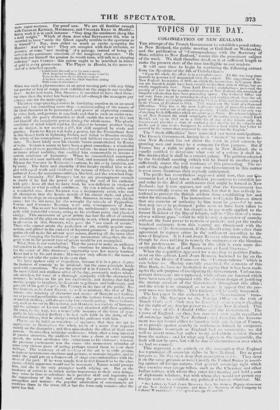alosing of the Theatres during Passion Week all'ords managers a
capital opportunity for making ready the Easter amusements : moreover, it leaves its a little space to vent a few thoughts suggested by Mr. 4:0 %ems K Est tu.e's late perfiirmances, an ilia it would have been tomr;,.•ions to ex proi.s with pointed reference to his reappearance. The over-ciabora time or his style on these occasions rendered the art of the hi -trio polpably evident; and the deliberateness of the action ereibled oee to detect the mechanism that set in motion the voluntary initonettoth Surely there must he a radical defect in at system that re'ticar-ces at lifial to tile et mdition of a living machine for performing stag,:-trias. This parade of the resources of the art of acting, 1101y- te, cc', is not peculiar to Clientele Kai:tines: ; it is ci ltcichly character's tie of all the popular players of the present day, though in different forms. With Maeitsmov, the machinery works in a grating way, its if the wheels were rusty aced wanted oil ; with Cilititi.Es KLAN, its movements are intermittent and galvanic ; while in 'NIMES'S entle, though even and polished, its :tete») is sharp and angular. I ltd triumph of' art is to conceal art ; but the only way to achieve this triumph is to call in the aid of a greater power--nathre.
" One touch of nature makes the whole world kin this one touch is wanting. Modern playing is devoid of soul ; the boasted art is a
mere rapid mortuum. For proof new. We are all familiar enough with CuAni.ES KEMBLE,141ACREADY, and CHARLES KEAN in Hamlet— heavy work it is in each instance : "they drag the sentiment along like a dead weight." Which of them does what BETTERTON did, who is 'recorded to have "made the Ghost equally terrible to the spectator as to himself"? Nay, does either so much as excite sympathy for Hamlet? And why not ? They are occupied with their attitudes, or gestures, or some" new reading" of a passage, instead of being ab- iairbed in the passionate emotions of the imaginary character. "He
hatfeels not himself the passion he would raise, will talk to a sleeping t
audience," says Cl1113ER this axiom ought to be inscribed in letters of gold iu every green-room. The Player in Hamlet, in the mere re-
eital of a detached speech,
could furce his soul 31/ tl, his own conceit, That. rutin woi king. all his visage wanted; TeatsiI lij.oyes, ithi that hes aspect, hrolten :oho, and his whole functiuu suiting With forms to his conceit.-
When was such a phenomenon as an actor turning pale with any thing but powder or loss of rouge ever exhibited on the stage in our recollec- tion ? As Ibr real tears, Mrs. SinnoNs is recorded to have shed them ;
hut since then the water has been turned otf—though the managers pay a heavy rate for the main-pipes.
rn stage-playingeonsists in simulating. emotion in an assumed The art
character : but iannething more tletn :al understanding of the nature of the ideal character to be perlsenated. and power of expressing emotion by voice, look, and gesture, is required; and that is, such an entire sym- pathy with the poet's abstraction as shall nable the actor to live and l'eel hintelf the imaginary person during the whole scene. The plastic ,,ensibility of mind which enables the player to become another being
en the instant, is not merely a lett skill acquired by study and
practice. En:tit:Nu KEAN was born a genius, but the Promethean heat in him blazed forth in lightning flashes, and failed to illumine steadily the whole of his conceptions: powerful and brilliant execution was his forte. We have lately seen his electric bursts counterfeited by flames ofrosin. GABBIER seems to have been a great comedian ; a wonderful mimie—not of mere peculiarities, but of nature : he must have possessed an innate pliant mobility, that enabled him momentarily to assume a certain condition of humanity, 1Vhen he counterfeited extempore the action of a man suddenly struck blind, and assumed the attitude of Elyinas the Sorcerer in RAPHAEL'S cartoon, he did so by intuition, not by study. The force and elasticity of this faculty enabled him to de- pict with equal truth and vividness the terrors of Giosicr's dream, the pathos of Lear, the conscience-stricken lluebet It, and the wretched frag- ment of humanity Abel Dragger ; but we are presumptuous enough to doubt if he had the power of melting the soul of his audience with pity : from all that we have read, he was deficient in strokes of tenderness, or what is called sentiment. lie was a mimetie artist, and a wonderful one. Joux Kumnix tvas a declamatory artist, who cast all characters into the heroic monld of his classic style, and placed them on the stage as on a pedestal. Mrs. Swooxs, in some sort, did the same ; but she did more, Jim she wrought the miracle of Pygmalion. Youm: and ClIA IMES KENBLE v ere only consequences of JOHN KEMBI.E. MAcitEAOr has introduced the melodramatic style into tra-
gedy with wonderful success, owing to his studious pains and physieal energy. This succession of great artists has had the effect of turning the attention of the players too exclusively to art, which predominated iu all—even in Mrs. Stutioxs, who gave the " one touch of nature." Those lt ho cannot attain the perfection of art, readily acquire man- nerism, and glitter in the cast coil of departed greatness. II an original
genius should make his advent next season, drawing all the town after him. an). changing the fashion of stage mannerism altogether, the one
great wain in the present race a actors would be yet misapplied. What, then, is our conclusion? That the power to make an audience
feel consists in the actor suffering the emotions he simulates. In that lay the secret of Mrs. Sionoss's superiority over her stately brother. KEAN had it by fits and starts ; Mae HEADY only affects it ; the mass of actors do riot take the pains to do even that.
We have spoken only of tragedians, because it is in a irreitt degree
the business of comedy to be artificial : but the same principle holds good with comedians. We see the proof of it in FARREN, who, though
the most idniful and studious artist of the day, constantly makes whole- sale mistakes, for want of a thorough sympathy with the eltaracter he
assumes I L relics on his art too exclusively, and flailing that flat in moving people tit laughter, he descends :o grimace and buffoonery, and goes out of his part to pobe Mr. Fa MIEN in the face of the public. Na- tive humour, as in JOHN Ii LEVI:, a.; well as mimicry, like that of MA- THEWS--t he mimicry of charaeter and modes of thouelit and feeling. not of personal peenliarities merely—and the various forms and degrees of mini runt drollery, will always vary low einneily act ing. Sheer 1 in noon- ery, suet: as we see in BUCKSTON mid It .tiii.nr, is a variety of hinnour; and Ilte !riniace of 1,1;;ToN and :NI UN ii its Oir,eured still liner qualities. MuNnLN, by the way, was a retnarl,able instance of the force of sym- pathy in imemirying drollery ; he lnal such faith in the doing of the absurdest things, that he always carried his audienee with him.
'nit by habit so voracious of afflause, that they are apt to mmpprmu1i.afe to themselves the whole merit of a scene that depends mainly on the dram:Hist ; and thus miscalculate the effect of their own powers. So also they misjudge audiences: when, after a long interval of passive attention, the auditors !Hirst into a shout at some ranting spvcch, the actor attributes this enthusiasm to his violence; whereas the previmo: excitement was the eause—the momentary stimulus of some very Vicious piece of' acting perhaps roused them to vont their feelings. '1'lle tendency of all haehing of the art is to slide genius,
to repress spontaneous emotions and gesture, to restrain impulse, and to
make the pupil put on a framework of stage eon ventionalities with the (tress of the part. lf he were taught first to kel himself to be the elm. racier' all this apparatus would not be necessary : Nature would prompt dm, met she is the only prompter Worth relying on, lint as the tendency of artists is to attach ttedite tut iortonce to their own doings, they come in time to substitute tht ir peclulinr skill and ingenuity 'for the suggestions of the mind, and cramp the powers they ought to
strengthen and mature: the popular admiration of consummate art confirms them in the error, till at last the form only remains after the spirit has tied.



























 Previous page
Previous page